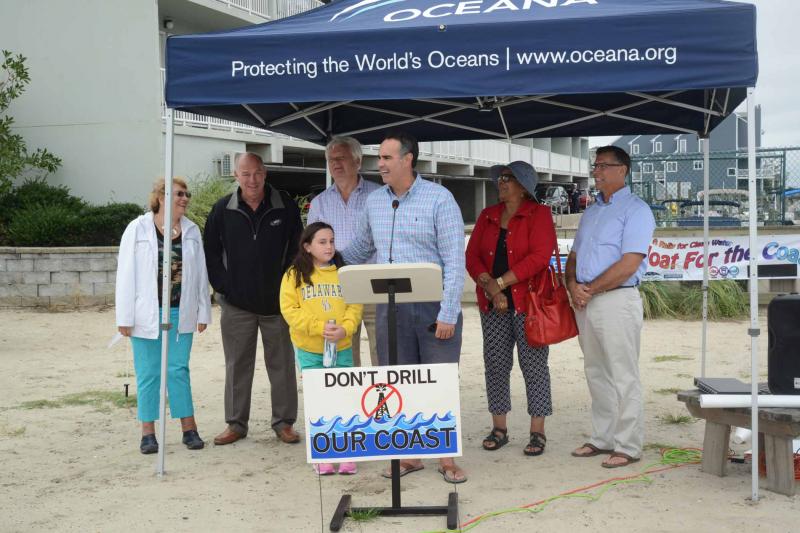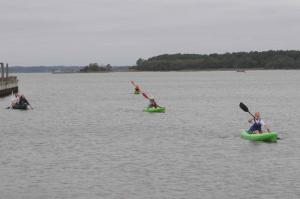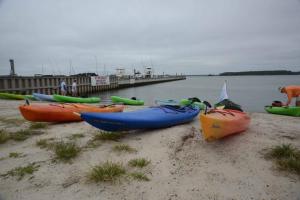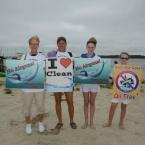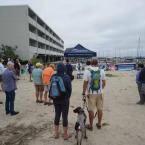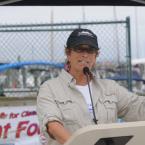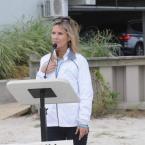Float for the Coast celebrates Delmarva’s fight against Big Oil
Participants from Virginia, Maryland and Delaware gathered in Dewey Beach Sept. 24 for the second annual Float for the Coast, a rally organized by the Assateague Coastkeeper and Assateague Coastal Trust to protest seismic airgun blasting off the Mid-Atlantic coast. This year, the conservation group Oceana, several local chambers of commerce, and other coastal-based nonprofits and businesses supported the event, which included a kayak paddle, on-the-water rally, formal press conference and reception sponsored by Dewey Beer Company.
After enthusiastic "kayaktivists" waved banners and held signs from the bay, they joined a crowd of reporters, local citizens, and other special guests gathered on the beach to hear community leaders and experts speak about the importance of protecting the coast from offshore oil and gas exploration and development. Special guests included Carol Everhart, president and CEO of the Rehoboth Beach-Dewey Beach Chamber of Commerce; Sally Boswell from the Delaware Center for the Inland Bays; Tricia Arndt from the Delaware Department of Natural Resources and Environmental Control; John Doerfler, chair of the Delaware Chapter of the Surfrider Foundation; Matt Pluta, Choptank Riverkeeper; Rep. Pete Schwartzkopf, Speaker of the House in the Delaware General Assembly; Rep. Steve Smyk, R-Lewes-Milton; Ted Becker, Mayor of Lewes; and Stell Selby, mayor of Milton
Kathy Phillips, Assateague Coastkeeper and executive director of the Assateague Coastal Trust, kicked off the press conference. "Over the past year, stakeholders from all corners of the Mid-Atlantic have been working tirelessly to fight Big Oil's grab for the Atlantic. From chambers of commerce, to local fishermen, to ocean protectors and educators, across our states from border to border - despite political differences and in spite of the well-funded efforts of the oil and gas industry to defeat us - we secured a victory," she began. "In March of this year, the federal government listened to our concerns and recognized that our Atlantic is too valuable, too special, and too vulnerable to drill. In a bold move, they cancelled the entire Atlantic lease sale and protected our ocean and coastal communities from offshore drilling for years to come, and the reason they did that is your advocacy."
One of the ways coastal communities have demonstrated their opposition to oil and gas development has been passing formal resolutions opposing offshore drilling and seismic airgun blasting. The Mid-Atlantic region has been particularly engaged: 100 percent of coastal communities along the Delmarva Peninsula, from Lewes in the north, to Northampton County, Va. in the south, have passed such resolutions.
Diane Hanson, former mayor of Dewey Beach, and current council member, spoke about the reasoning behind passing a resolution in her town, which was one of the first in Delaware to do so. "Our beaches are world-renowned tourist destinations," she said. "We proudly cater to millions of visitors each year and contribute over a billion dollars to Delaware's economy. Here in Dewey Beach, we understand the importance of protecting and preserving the health of the ocean, which is why we, along with six other Delaware towns and over 115 in East Coast states, passed a resolution formally opposing oil and gas development in the Atlantic. Not only did we pass this resolution, we brought it all the way to the White House in person, to make sure those decision-makers understood what was at risk."
Along the Delmarva coast in Delaware, Maryland,and Virginia combined, roughly 205,000 jobs and over $11.4 billion in gross domestic product rely on healthy ocean ecosystems, mainly through fishing, tourism and recreation. And although the Atlantic Ocean is temporarily safe from offshore drilling, seismic airgun blasting to search for oil and gas in the Atlantic, including the coasts of Delaware, Maryland and Virginia, is still being pursued and could threaten these industries.
Seismic airguns, which shoot intensely loud blasts of compressed air through the water and miles into the seabed and reflect back information about oil and gas deposits, are towed behind large ships for days or even weeks on end during this process. These blasts have been known to cause various fish species to temporarily or permanently relocate, can harm the development of bivalves like clams and oysters, and are especially dangerous for whales and dolphins.
"Underwater noise produced in the oceans by humans is having an immense adverse impact on marine species, most notably marine mammals such as whales and dolphins," said Suzanne Thurman, executive director of the Marine Education, Research, and Rehabilitation Institute, based in Lewes. "These animals rely on sound to survive in their marine habitat, and can no longer communicate, find food or navigate on their ancient migratory routes. Their very survival is threatened as a result. Seismic testing contributes significantly to life threatening sound in the oceans, causing temporary and permanent hearing loss and even death."
Opposition from marine conservation, animal welfare, and fisheries management organizations has been strong. In 2015, 75 leading marine scientists wrote a letter to President Obama stating that "opening the U.S. east coast to seismic airgun exploration poses an unacceptable risk of serious harm to marine life at the species and population levels, the full extent of which will not be understood until long after the harm occurs."
State Sen. Ernie Lopez, R-Lewes, also spoke at the event, and recently led a sign-on letter asking President Obama to deny applications to conduct seismic airgun blasting in the Atlantic which was signed by 43 state and local legislators from Delaware. Maryland officials sent a similar letter signed by 42 legislators. "I looked at what was happening with the permitting, assessed concerns from the scientific community, and realized how hard coastal communities like Lewes and Dewey Beach were working to protect their way of life, and I thought – I can help. These are my constituents, and these are the beaches that I love and want to protect for my daughters to know and love too. We have already said no to offshore drilling, and the decision-makers in Washington listened. It's time for President Obama to listen again, to read our letters, to pay attention to coastal communities and prevent seismic airgun blasting in the Atlantic."
Oceana's Mid-Atlantic Campaign Organizer Caroline Wood concluded the press conference with a call to action and invitation to a reception at Que Pasa, just next door. "This year at Float for the Coast, we have brought our powerful voices to Dewey Beach to highlight some of the strongest opposition in the Mid-Atlantic, to celebrate together the work we've done so far, and to call on the federal administration to fully protect our coast from oil and gas development. We know that we have the power to stop this, and we won't stop until we do."











